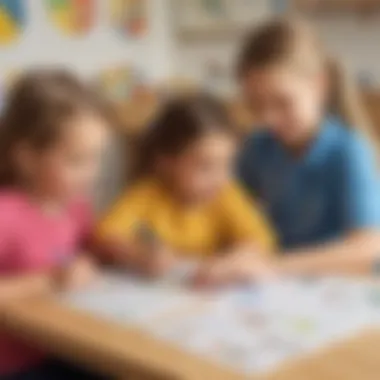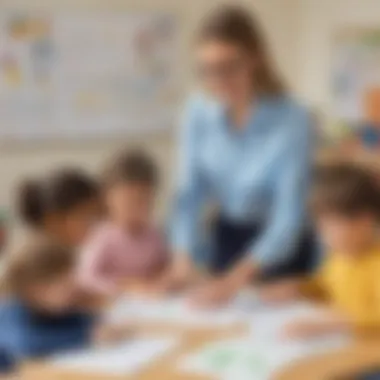Exploring the Significance of Kindergarten Worksheets in Early Childhood Education


Interactive Learning Games
In the realm of early childhood education, interactive learning games have emerged as invaluable tools for enhancing cognitive development in young learners. These games, designed with a focus on educational content, not only entertain but also offer a wealth of benefits for children's growing minds. From popular games like ABC Mouse and Reading Eggs to math-centric apps such as Prodigy, these resources engage children in a fun and interactive way, fostering a love for learning from an early age. Additionally, game reviews provide insights into the gameplay dynamics and the learning outcomes achieved, helping parents and educators make informed decisions about incorporating these games into their educational arsenal.
Educational Topics
Incorporating a wide range of educational topics into kindergarten worksheets is essential for fostering a well-rounded and holistic approach to learning. By compiling articles that cover various subjects such as math, science, languages, and more, educators can ensure that children are exposed to diverse knowledge areas from an early age. This interdisciplinary approach not only cultivates a curiosity for different fields but also promotes critical thinking skills and a deeper understanding of the world around them.
Tips and Tricks
To enhance the learning journey of young children, practical tips and tricks serve as valuable resources for both parents and educators. Strategies that make learning engaging and interactive are key to sustaining children's interest and motivation in educational activities. By infusing elements of play and exploration into lessons, educators can create a dynamic and enriching learning environment that caters to the unique needs and preferences of each child. These tips aim to lay the foundation for a lifelong love of learning and academic success.
Creative DIY Projects
Encouraging creativity through do-it-yourself (DIY) projects not only boosts children's artistic abilities but also improves their cognitive and motor skills. Step-by-step guides for engaging DIY activities provide children with hands-on experiences that enhance problem-solving ability and foster a sense of accomplishment. Moreover, creative craft ideas utilizing everyday household items spark imagination and promote artistic expression, contributing to children's overall development and well-being.
Introduction to Kindergarten Worksheets
In the realm of early childhood education, the introduction to kindergarten worksheets holds paramount importance. These foundational resources serve as the bedrock upon which young minds begin their educational journey, instilling essential skills and fostering developmental growth. Kindergarten worksheets act as structured tools that provide a framework for learning and skill-building, offering a scaffolded approach to knowledge acquisition. By delving into the specifics of kindergarten worksheets, this article aims to illuminate their significance in shaping the formative years of children.
Defining Kindergarten Worksheets
The Purpose of Kindergarten Worksheets
Kindergarten worksheets play a crucial role in facilitating interactive learning experiences for young learners. These worksheets are meticulously designed to engage children in educational activities that enhance their cognitive abilities, promote critical thinking, and lay the foundation for academic concepts. The purpose of kindergarten worksheets lies in their ability to scaffold learning tasks, providing a structured framework that aids in comprehension and retention. By offering a hands-on approach to education, these worksheets stimulate curiosity, creativity, and problem-solving skills in children.


Types of Kindergarten Worksheets
Kindergarten worksheets come in various forms, catering to a wide range of learning styles and developmental needs. From alphabet tracing sheets to math problem-solving exercises, the types of kindergarten worksheets cover a diverse array of subjects and skill sets. Each type serves a unique function in reinforcing key concepts and reinforcing learning objectives. By encompassing visual, auditory, and kinesthetic modalities, these worksheets cater to the multidimensional learning styles of young children, ensuring holistic skill development.
Role of Worksheets in Early Learning
The role of worksheets in early learning is multifaceted, with their benefits extending beyond academic enrichment. Worksheets not only aid in knowledge acquisition but also foster independence, concentration, and self-discipline in young learners. By engaging with worksheets, children learn to follow instructions, organize information, and work towards achieving specific goals. Additionally, worksheets promote a sense of accomplishment and mastery, boosting children's confidence and motivation to explore new concepts and challenges.
Impact of Worksheets on Early Childhood Development
When considering the impact of worksheets on early childhood development within the context of this article, it becomes evident that these educational tools play a pivotal role in nurturing young minds. Worksheets are instrumental in fostering cognitive, social, and emotional growth, providing a structured framework for learning and skill development. Their significance lies in enhancing the overall developmental trajectory of children by offering engaging and interactive ways to explore various concepts and skills. Through a comprehensive analysis of the benefits and best practices associated with using worksheets in kindergarten settings, this section aims to illuminate the critical role these resources play in shaping the educational journey of young learners.
Cognitive Advantages
Memory Retention
Memory retention is a fundamental aspect of cognitive development that holds immense importance in early childhood education. In this article, memory retention through worksheets is explored as a means to reinforce learning and retention of key concepts. By engaging students in activities that require memory recall and application, worksheets facilitate the strengthening of cognitive processes necessary for future academic success. The unique feature of memory retention within the context of worksheets lies in its ability to create lasting impressions and connections, aiding children in building a solid foundation of knowledge. While memory retention through worksheets offers numerous advantages in solidifying learning, it is essential to adapt strategies to address individual learning styles, ensuring optimal retention and comprehension as part of the educational journey.
Language Development
Language development plays a crucial role in early childhood development, and its integration with worksheets is paramount in nurturing linguistic abilities. Within the scope of this article, language development through worksheets is examined as a tool for enhancing communication skills and vocabulary acquisition. By providing exercises that encourage language exploration and expression, worksheets facilitate the progression of language competencies in young children. The unique feature of language development via worksheets is its ability to engage children in interactive language tasks that promote both verbal and written communication skills. While language development through worksheets offers multiple advantages in fostering linguistic proficiencies, it is vital to consider individual learning paces and tailor activities accordingly to maximize language acquisition and proficiency.
Numeracy Skills Enhancement
Numeracy skills enhancement is a fundamental component of early childhood education, with worksheets serving as essential resources in this domain. The article delves into the significance of numeracy skills enhancement through worksheets, focusing on cultivating mathematical abilities and problem-solving aptitude. By incorporating numeracy-focused activities that challenge children to apply mathematical concepts in practical scenarios, worksheets play a vital role in strengthening numerical fluency and reasoning skills. The unique feature of numeracy skills enhancement via worksheets lies in its ability to scaffold learning, providing a gradual progression from basic to advanced mathematical competencies. While numeracy skills enhancement through worksheets presents numerous advantages in building a strong foundation in mathematics, it is essential to adapt tasks to cater to varying levels of mathematical proficiency, ensuring a comprehensive development of numeracy skills.
Educational Approaches and Philosophies in Kindergarten


In the landscape of early childhood education, the consideration of various educational approaches and philosophies in kindergarten holds paramount importance. These frameworks provide the foundational structure upon which the educational journey of young learners is molded, influencing their cognitive, social, emotional, and developmental growth. By delving into the diverse methodologies and beliefs that underpin kindergarten education, educators, parents, and caregivers gain valuable insights into creating effective learning environments that cater to the holistic needs of children.
Montessori Method and Worksheets
Emphasis on Self-Directed Learning
The Montessori educational approach places a strong emphasis on self-directed learning, empowering children to take control of their educational journey. By allowing students the freedom to choose their activities and explore concepts at their own pace, the Montessori method fosters independence, self-motivation, and a love for learning. This aspect is particularly beneficial in nurturing intrinsic motivation and instilling a sense of responsibility in young learners. However, while promoting autonomy and curiosity, it is essential to guide children towards productive tasks and ensure a balance between freedom and structured guidance.
Incorporating Worksheets in Montessori Environment
Integrating worksheets into the Montessori environment complements the hands-on, experiential learning approach of this method. Worksheets can serve as tools for reinforcement, documentation of progress, and extensions of hands-on activities. They provide opportunities for children to practice newly acquired skills, engage in meaningful tasks, and showcase their understanding through varied means of expression. However, to align worksheets effectively with the Montessori philosophy, it is crucial to maintain the tactile, interactive nature of learning experiences and cater to individual learning preferences and styles.
Supporting Exploration and Discovery
The Montessori approach encourages exploration and discovery as fundamental aspects of learning. Worksheets can support this aspect by offering open-ended activities, problem-solving challenges, and creative outlets for self-expression. They contribute to the holistic development of children by enhancing their cognitive abilities, fostering curiosity, and promoting experimentation. Nevertheless, it is essential to strike a balance between structured learning goals and allowing space for free exploration to ensure that worksheets serve as facilitators rather than constraints in a child's educational journey.
Reggio Emilia Approach to Worksheets
Artistic Expression through Worksheets
The Reggio Emilia approach emphasizes artistic expression as a powerful tool for communication and learning. Using worksheets as a means of artistic exploration enables children to convey their thoughts, emotions, and perspectives in creative ways. Artistic expression through worksheets not only enhances visual literacy and aesthetic awareness but also encourages critical thinking, problem-solving, and collaboration. However, while promoting artistic freedom, it is important to guide children towards meaningful interpretations and reflections to enrich their learning experiences.
Documentation of Learning Journeys
In the Reggio Emilia approach, documentation serves as a record of children's learning journeys, capturing their progress, ideas, and growth over time. Worksheets can play a significant role in documenting these experiences, providing a tangible representation of children's thoughts, explorations, and discoveries. By encouraging children to engage with documentation processes, worksheets facilitate self-assessment, reflection, and goal-setting. Yet, to harness the full potential of documentation, it is vital to create spaces for collaborative reflections, meaningful dialogues, and shared experiences based on the captured insights.


Encouraging Self-Expression and Creativity
Encouraging self-expression and creativity through worksheets aligns with the core principles of the Reggio Emilia approach. By offering open-ended prompts, thematic inquiries, and exploratory challenges, worksheets become avenues for personal expression, divergent thinking, and imaginative exploration. Supporting self-expression and creativity through worksheets nurtures children's confidence, autonomy, and sense of identity. However, it is essential to provide a nurturing environment that values diverse forms of expression, welcomes experimentation, and celebrates individuality to promote a culture of creative expression and self-discovery.
Traditional vs. Progressive Views on Worksheets
Balancing Structure with Flexibility
The debate between traditional and progressive views on using worksheets revolves around finding a delicate balance between structure and flexibility. Traditional approaches may rely heavily on worksheets as drill-and-practice exercises, emphasizing consistency, accuracy, and repetition. In contrast, progressive perspectives advocate for a more flexible use of worksheets, integrating them as tools for exploration, critical thinking, and creative expression. Striking a balance between structure and flexibility ensures that worksheets cater to both skill acquisition and higher-order thinking skills, accommodating diverse learning styles and preferences.
Adapting Worksheets to Individual Learning Styles
Adapting worksheets to cater to individual learning styles is a cornerstone of effective instructional practice. Recognizing that children possess unique preferences, strengths, and challenges, educators must customize worksheets to address individual needs, interests, and abilities. Personalizing worksheets enhances engagement, motivation, and comprehension, promoting a more inclusive and differentiated approach to learning. Despite the benefits of adapting worksheets, it is essential to maintain coherence, challenge all learners appropriately, and provide sufficient support to ensure meaningful and equitable learning experiences.
Aligning Worksheets with Curriculum Standards
Aligning worksheets with curriculum standards is imperative for ensuring that educational goals and learning outcomes are met effectively. By mapping the content, skills, and assessments covered in worksheets to established curriculum standards, educators can ensure that children acquire the necessary competencies and proficiencies. This alignment facilitates seamless progression, enhances continuity across learning experiences, and provides a clear roadmap for skill development. However, while aligning worksheets with standards provides structure and clarity, it is essential to balance standardization with creativity, innovation, and adaptability to meet the dynamic needs of 21st-century learners.
Conclusion
Embracing the Role of Worksheets in Kindergarten Education
Promoting Holistic Development
Embracing the concept of promoting holistic development through worksheets underscores the significance of addressing the comprehensive growth of children. This approach emphasizes the integration of cognitive, social, emotional, and physical aspects to facilitate a well-rounded development in young learners. By utilizing worksheets that focus on holistic development, educators can ensure that children receive a balanced and inclusive educational experience, promoting their overall well-being alongside academic advancement. Implementing worksheets that cater to holistic development enhances the depth and breadth of learning, nurturing children into multifaceted individuals prepared for the challenges of the future.
Cultivating Lifelong Learning Skills
Cultivating lifelong learning skills through worksheets instills a fundamental ethos of continuous growth and adaptability in young learners. By emphasizing the development of skills such as problem-solving, critical thinking, creativity, and communication through worksheets, children are equipped with the tools necessary for ongoing educational and personal enrichment. Worksheets that cultivate lifelong learning skills pave the way for a perpetual journey of discovery and improvement, encouraging children to embrace challenges and seek knowledge beyond the confines of traditional learning environments. This approach not only enhances academic achievement but also fosters a mentality of curiosity and exploration essential for success in a rapidly changing world.
Enhancing Engagement and Retention
The incorporation of strategies aimed at enhancing engagement and retention through worksheets plays a crucial role in maximizing the effectiveness of early childhood education. By utilizing interactive and immersive activities within worksheets, educators can capture the attention and interest of young learners, making the learning process more stimulating and memorable. Enhancing engagement through worksheets ensures that children remain actively involved in their educational experiences, fostering a deeper connection to the content and concepts being taught. Additionally, strategies focusing on retention through worksheets help solidify learning outcomes, ensuring that knowledge and skills acquired are retained over time, contributing to long-term academic success and personal growth.















